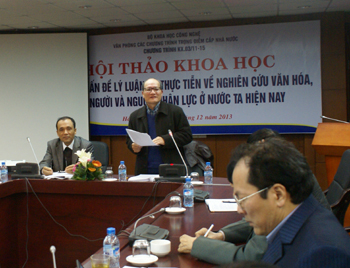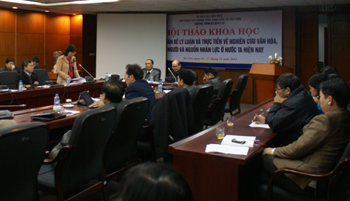
Participating in the conference, there are Asso. Prof. Dr. Mai Quynh Nam, Vietnam Academy of Social Sciences and Head of the Program No. KX 03/11-15; Asso. Prof. Dr. Vu Van Quan, University of Social Sciences and Humanities, Hanoi National University; and heads as well as secretaries of the 20 research projects within the framework of the Program KX.03/11-15, coming from different institutions of Vietnam Academy of Social Sciences, Ministry of Science and Technology, Ministry of Investment and Planning, Ho Chi Minh National Academy of Politics and Public Administration, Institute of Workers and Trade Unions, Hanoi National University, Vietnam Association of Historical Sciences, Central Propaganda and Training Commission, Ministry of Culture, Sports and Tourism, and Ministry of Information and Communications etc.
Making the opening speech of the conference, Asso. Prof. Dr. Mai Quynh Nam emphasized that the State-level Focal Scientific and Technological Program for the phase 2011 – 2015 focused on scientific research for cultural and human development and human resource quality improvement. This program is carried out in the context of our country development from now to the year of 2020 and afterwards. It aims at providing theoretical grounds and practical basis on the relationship between culture and development, cultural changes in the transition from traditional society to modern society, and human rights for the purpose of cultural and human development. The program also focuses research projects on: (1) orientations for management and leadership culture, and recognition of cultural values in social activities in the process of social development and international integration; (2) orientations for human ethical, lifestyle and manner building in social activities for the purpose of the country development; (3) assessments of the real status of human and human resource by sectors, based on which human resource forecasts are made for specific sectors in order to meet requirements of socio-economic development to 2020.

At the conference, discussions were focused on following topics: Knowledge that should be added to the theoretical system of cultural, human and human resource research; Roles of inter-disciplinary research in achieving the above-mentioned academic goals; Relationship between theoretical and empirical issues in organizing and conducting research work; Relationship between application of research findings and policy recommendations.
Seven papers were presented at the conference, including: (1) “Roles of social capital in development of young human resource for industrialization and modernization of the country” (by Asso. Prof. Dr. Nguyen Hoi Loan); (2) “Some theoretical and practical issues on cultural rights in promotion of cultural diversification in our country at present” (by Dr. Hoang Van Nghia); (3) “Roles of culture, human and human resource in economic restructuring and growth-model transformation in Vietnam” (by Dr. Luu Duc Hai); (4) “Theoretical and practical grounds on human sustainable development in the world and Vietnam” (by Dr. Dao Thi Minh Huong); (5) “Roles and Responsibilities of female intellectuals in development of the Capital City - Hanoi” (by Asso. Prof. Dr. Nguyen Thi Viet Thanh); (6) “Imperative needs in research on cultural industrial development from the cultural perspective and impacts on young generations in Vietnam at present” (by Asso. Prof. Dr. Nguyen Ngoc Ha); and (7) “Vietnam’s foreign affair information work in the early 21st century: Achievements and Development Orientations” (by Asso. Prof. Dr, Nguyen Huu Cat).
Main contents mentioned at the conference include:
- Important role of the cultural factor in the country development. Analyses show that it is necessary to respect identities of each culture, including also peripheral ones, in order to avoid imposition of a dominant culture or prevent conflicts among different cultures in the context of globalization. Cultural diversification is therefore indispensable, in addition to cultural globalization. Social values are linked with each other, constituting a system (also called as the scale) of values. Research works on values of residence communities, including also religious ones, which aim at building and improving ethics and lifestyles of Vietnamese people at present, demonstrate that religious values lie in a system of particular values different from other systems of values; they have some similarities with cultural values and they cause a profound influence on ethics and lifestyles of religious communities. Research works on orientations for cultural industrial development as well as impacts on young generations of Vietnamese people focus on analyzing practical factors of cultural industrial development in Vietnam at present, including: the structure of cultural industries; reality of ownership in the cultural industries; consumption reality of cultural industrial products; competitiveness and integration of cultural industrial products, in order to highlight the reality of management policy in development of cultural industries in the period of industrialization and international integration in Vietnam.
- Human sustainable development in Vietnam to meet requirements for acceleration of industrialization, modernization and international integration is the major and dominant theme of the State-level Focal Scientific and Technological Program No. KX 03/11-15. Human sustainable development is characterized by some main dimensions as below: (1) equality of opportunities to access social resources for capacity improvement; (2) equality in sharing development achievements; (3) people are empowered with freedom of participation in development process according to their ability; (4) current development do not deprive future generations of opportunities; and (5) human security must be guaranteed. These are theoretical treatises to be used as the basis for human research and implementation of human rights for the sake of development goals. Human research is also brought out in awareness of theories and practices of Vietnamese family, as family carries some basic functions such as: human reproduction, re-creation of human resource, reception and dissemination of culture. The change in family size from traditional to modern one with new values and norms has been resulting in basic changes in Vietnamese family. Research works on cultural rights show basic human-rights issues in cultural preservation, reception and creation. Cultural rights are closely attached with systems of economic, civil and political rights… as well as the system of law in implementation of the State of jurisdiction. Basic viewpoints expressed through all development strategies of the Communist Party and the State, including “the people are the root of the nation” and “human is both dynamic and target of development”, are the ground for development orientations that consider human as the center in order to improve the people’s living standards. Recent achievements in poverty reduction, development of culture, healthcare and education, building of social safety-net and human security illustrate that Vietnam has gained significant steps in human sustainable development.
Human resource development is synchronously carried out in correlation with growth-model transformation as well as roles of social capital and the force of female intellectuals. Human resource is closely attached with training. Training quality plays a decisive role in what quality of human resource we will get. Attraction and utilization of talents in social systems at different levels are important in conducting effectively the growth-model transformation in Vietnam at present. Positive and negative impacts caused by social capital on young human resources were shown at the conference, which were then used to make suggestions for improvement of training quality for students, enhancement of vocational training quality as well as suggestions in finding and cultivating aptitudes and talents. Suggestions to set up a legal corridor for maintenance and utilization of social capital for the purpose of young human resource development are also made at the conference. The role of female intellectuals has been studied, based on the theoretical system of social structure. Female intellectuals are viewed as a social force that is characterized by social labor features and gender roles.
Discussions about the above-mentioned issues are not only used for assessments of research projects within the Program No. KX03/11-15 that have been done for the past time, but also point out the theoretical issues that need improving and revising for the coming time. The conference was a really helpful forum, where scientists could present their research findings based on the theoretical and practical grounds relating to the goals of the Program.
Nguyen Thu Ha







